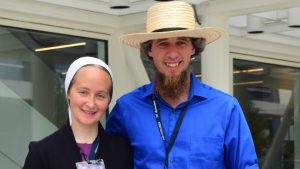The beginning of a new year is always a good time to evaluate personal habits and priorities.
In fact, setting priorities is one of the most important keys to living an abundant life. Each person needs to decide what to do—and not do—based on their unique goals and calling.
Simple living can be defined as being satisfied with what we have rather than what we might wish for. Individuals often choose simple living for a variety of personal reasons, such as spirituality, health, quality time for family and friends, work–life balance, financial sustainability or reducing stress. Choosing to live simply can also be a reaction to materialism and over consumption.
Managing our Stuff
Human beings crave order and peace. That’s one reason why having too much stuff (or stuff that is disorganized) can adversely affect us mentally and physically.
It’s an exhausting pursuit to acquire—and then organize and maintain—a lot of possessions, and that may very well be why minimalism is a growing movement. According to Joshua Fields Millburn and Ryan Nicodemus of theminimalists.com, “Minimalism is a tool to rid yourself of life’s excess in favor of focusing on what’s important.”
Too many times, without even realizing it, we give our possessions a disproportionate amount of time and energy, leaving us with lifestyles and financial obligations that don’t match our values. In an article for Vibrant Life magazine titled “You’ll Feel Better Without Clutter” Vicki Redden suggests that before buying something new, or while deciding what to keep of your current possessions, you should ask yourself three questions:
- Do I need it?
- Do I love it?
- Do I have a place for it?
Choosing to live simply gives you the power to say no to the non-essentials.
Managing our Time
In addition, simple living brings about true freedom of spirit, which helps us focus more on our relationships. In his book Crazy Busy, Kevin De Young shows how being too busy ruins our joy and robs our relationships. We are so anxious or distracted that we don’t have time for the people most important to us.
Abby Sasscer, a homeschooling mom and author, uses the term voluntary simplicity to describe her family’s spiritual journey and says that the beauty of it all is that there are no set rules or regulations when it comes to voluntary simplicity. “It is partly a lifestyle and a mindset, but mostly a disposition of the heart and soul,” Abby says. It is the gratitude that flows from acknowledging that God has provided enough. “Like a dove flying freely towards the heavens, simple living brings about true freedom of spirit, gives us lasting joy and leads us closer to the heavenly kingdom.”
The Simple Life: Amish and Adventist
Adventists have much in common with—and also much we could learn from—the Amish. We both value simplicity in lifestyle, a connection with nature, and nurturing strong families and communities.
Andy and Naomi Weaver, along with their eight children, live in West Salem, Ohio. In August 2014, Andy and Naomi were baptized and became members of the Seventh-day Adventist Church.
“When we became Adventists, we had to decide whether we would leave our Amish lifestyle behind or keep it,” says Andy. They chose to stay Amish, not based on religious requirements, but to help further their dream of establishing an Amish Seventh-day Adventist church in their community.

Photo: Marcos Paseggi/Adventist Review
Andy and Naomi Weaver










